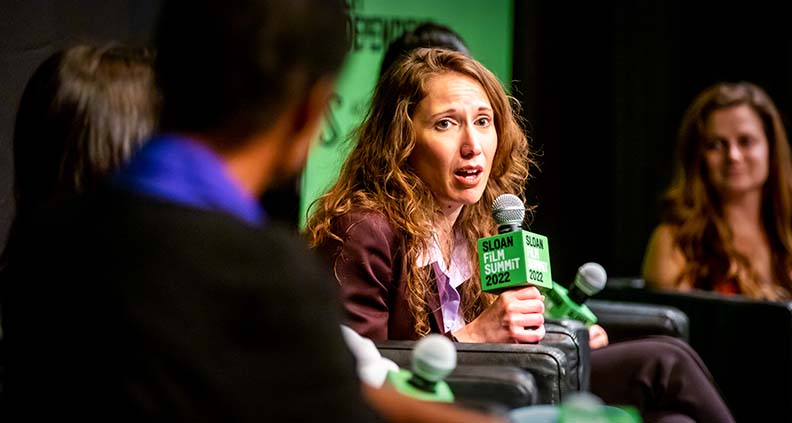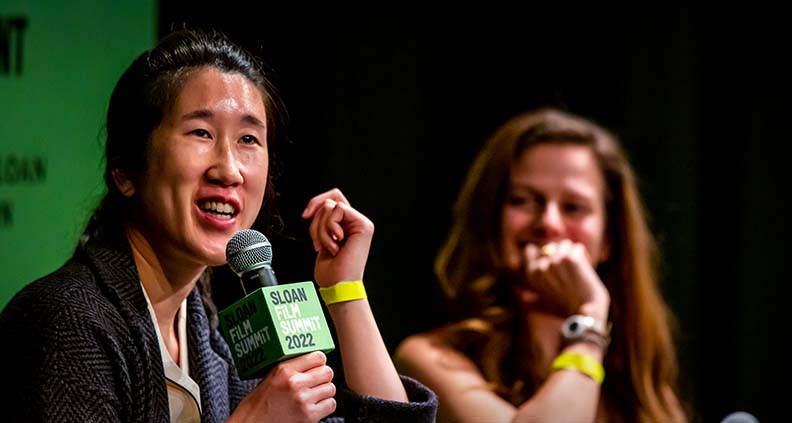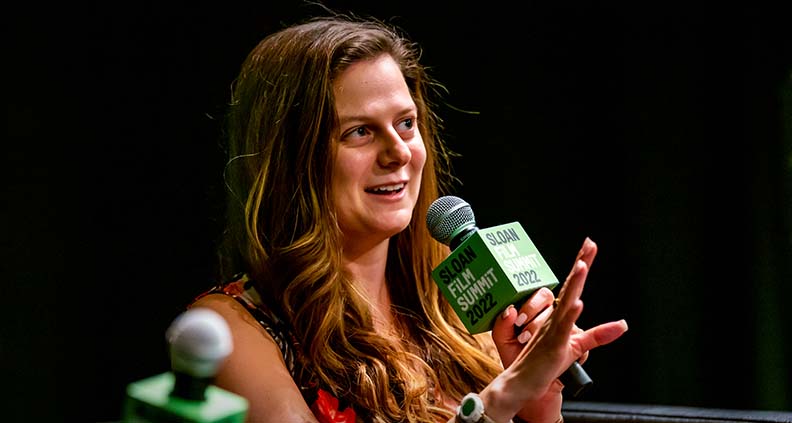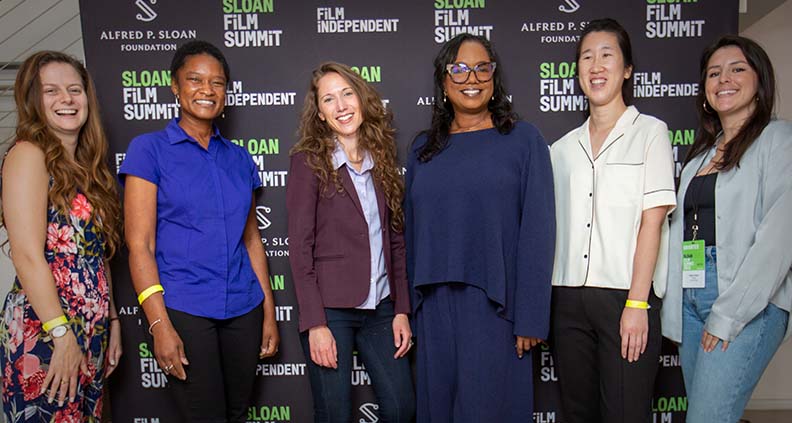‘Women in Science and Film’ Panel Explodes into Orbit, Grows Its Own and Looks to the Stars
“One day soon, this kind of panel will be obsolete.” So said writer and producer Wendy Calhoun by way of her introduction to the 2022 Sloan Film Summit “Women in Science and Film” conversation on April 9, at the Tateuchi Democracy Forum in Little Tokyo. The all-female panel, which Calhoun described as a “time capsule” in the making, brought two of America’s most prominent scientific voices—NASA Flight Systems Engineer Tracy Drain and Dr. Ziva Cooper, Director of UCLA’s Cannabis Research Initiative—together with three young filmmakers currently developing Sloan-support science-based film projects.
Calhoun asked Drain what set her on the path to such a renowned career. Drain said she was drawn to science and outer space exploration by her mother’s interest in sci-fi. “So thank you to all you creative folks,” she said to the filmmaker-heavy audience. “I wanted to figure out how to do something in the world that was like Star Trek, so I decided to get into engineering,” eventually leading her to the field of robotics and space technology.
Cooper echoed her peer’s sentiments. “It’s really wonderful to be here with the film industry among the people who are doing the research to develop an accurate depiction [of] what science is actually like. A lot of people these days go to entertainment for their information.” Following in the general path of her scientist father, Cooper eventually met several female mentors whose work drew her toward the study of psychoactive chemicals—an emerging, controversial and occasionally illegal (at the federal level, at least) field of research.

Launch Fever writer/director Sabrina Ehlert—whose Sloan-supported short (currently in pre-production) tells the story of Latinx NASA engineer Rodney Rocha’s frustrated attempts to prevent the Columbia Space Shuttle disaster—can relate to Cooper’s science-based upbringing. He mother is a structural engineer, not to mention a Mexican immigrant and first-generation college graduate. Her father and brother? Another structural engineer and an aerospace engineer, respectively. “And I’m a filmmaker,” she laughed. “They’re like, What happened?” Ehlert said that when people learn about Launch Fever, they’re often surprised at the the choice of material. “But I’m going to own it,” she said. “I love it.”
The Mushroomers—writer/director Erica Liu’s debut feature (currently in development)—tells the story of a fictional micrologist grieving the death of her partner, who works through her emotional struggle by using wild mushrooms to ameliorate a dying patch of old-growth forest behind her house. Liu was first drawn to the world of fungi after reading about biologist Merlin Sheldrake. “I immediately went down a rabbit hole of research,” she said. “Like, way, way too much research,” saying that her first couple of drafts of the script were far too dense for general audiences. “Too many mushroom facts,” she sighed.

Screenwriter Marian Whitaker’s feature-length action-adventure script Northern Lights was born out of her frustration seeing the same types of mainstream stories consistently being churned out by Hollywood, over and over. “There are so many stories out there about women, that we overlook all the time,” she said. “That’s when I decided I wanted to go to Hollywood and contribute to telling these stories.”
Her idea for the Alaska-set, Jurassic Park-influenced Northern Lights began after two summers spent in the Last Frontier as a camp counselor and zip-line instructor, where she was captivated by the aurora borealis. “A phenomenon that has gripped cultures around the world for thousands of years,” Whitaker said. After learning about Sloan, she developed an idea about a scientist caught in a wild adventure trying to determine the material source of the odd whisper-like sounds associated with the lights. “Scientifically, they really haven’t figured it out,” she said.

Calhoun asked the filmmakers about creating authentic female protagonists—or, in Ehlert’s case, a dramatic interpretation of a real-life male figure nonetheless operating in opposition to an entrenched male-led bureaucracy. Liu said that even as a young filmmaker society’s hardwired unconscious bias led her to resist an instructor’s suggestion to gender-swap her short’s male lead, feeling at the time that a female character “wouldn’t be interesting enough.”
Speaking from the perspective of a female scientist of color working in a field whose public perception is that of a bunch of balding white men in glasses wearing short-sleeved dress shirts, “There are lots of people, where it just never occurred to them to do something because they just never saw a representation of that, it wasn’t in their brain.” She added: “It’s important for young girls and women to see female representation [as scientists in media], but I think it’s even more important for men to see representations of women in these roles.”

“Being an immigrant and wanting to become an engineer, my mom was met with a lot of obstacles,” said Ehlert. She shared that her mom only recently revealed to her that, according to her, “In order to succeed she had to give her Latina identity”—even going so far as to change her surname. Cooper, too, knows what it’s like to sacrifice, putting off starting a family until 38 to concentrate on her work. Even then, she claims, “The Chair of my department didn’t even know I was pregnant until I went on maternity leave”—and returning to deliver a lecture a mere three days after giving birth.
These multi-dimensional questions of work-life balance applies to fictional female scientists as well. “Whenever I write female protagonists and male protagonists the process is the same,” said Liu, “But one thing I did notice is that whenever I write female characters, they’re scrutinized more than male characters, which I also feel is true in society.” But these prejudices have only amplified the filmmakers’ commitment to their creative POV.” Whitaker says she’s even made a commitment to herself to only write female protagonists—and to depict female friendships.
All this, Calhoun said, is in service of “Women telling their own stories and becoming prominent in fields traditionally dominated by men.” And, until such a time as panels like “Women in Science & Film” are no longer necessary, “We’ll keep fighting,” she said.
The 2022 Sloan Film Summit is happening April 8-10 in Los Angeles. Stay tuned to sloanfilmsummit.org for videos, blog recaps and more. Follow our coverage on Film Indepenent’s Twitter, Facebook and Instagram.
(Header photo credit: Jay Young)
